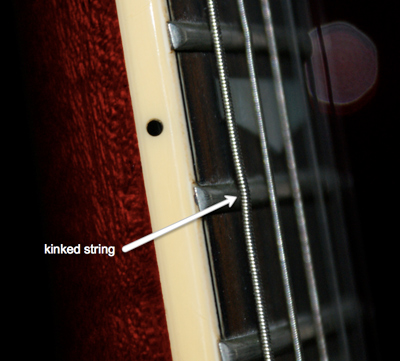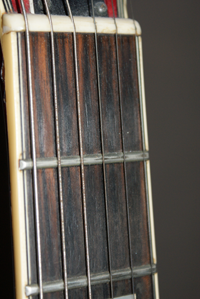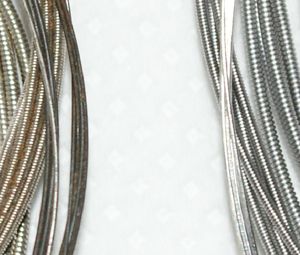|
Change Guitar Strings
FACT: You will need to change guitar strings at some point. Guitar strings NEED to be changed every now and again, and not just because they break. If your guitar has broken a string, don't worry, it happens. Having worked in a music store for many years I regularly dealt with distressed parents, and beginner guitarists who came into the shop thinking they were going to end up with a big bill for the 'repair' of their guitar. Explaining to them that strings do break and need replaced (and were inexpensive) helped them get over the disaster. And demonstrating that they could actually change guitar strings themselves certainly helped to brighten their day. There are a few different methods you can use to change guitar strings despite some people saying there is only one definite right way. There are however a few points that are essential to follow to ensure that strings are fitted correctly, and as long as you do follow these, you'll be just fine. Changing strings is relatively easy and once you have done it a few times you'll wonder why you were so frightened. Strings are quite cheap so if you are changing them for the first time get a couple of sets just in case you make a mistake, like accidentally putting a kink into one. Despite the scare mongering that goes on out there, it would be very difficult to cause any major damage to a guitar by re-stringing. The worst you are likely to do is break a couple of your new strings while you try to fit them by perhaps tuning them to high. Being able to change guitar strings is one of the basic maintenance tasks that any guitarist will master, along with tuning the instrument. You can change guitar strings one at a time, or remove them all if you wish to give the fretboard a good cleaning. The advice is often given that you should only replace strings one at a time to prevent damage to the neck due to changes in tension which may cause twisting or bending of the neck. This might happen if you snip all the strings with wire cutters quickly changing the tension on the neck, or remove strings individually while the rest are in concert pitch which could cause twisting. If you do wish to remove all strings (and I do quite often) be sure to loosen the tension of each string a few turns, moving from the low E (6th ) to high E (1st), then repeat, until all strings are basically flapping on the board. Why change them? Strings require changing for many reasons:They break due to being over-tensioned, or they have become rusty and lose elasticity so they can't stretch. They can also be broken by heavy handed playing, or sharp edges on bridge saddles or tuning pegs. Strings also lose their tone and brightness over time making them sound out of tune the further up the neck you play and no amount of tuning will get them back in tune. Kinks or flat spots in strings can also cause the string to play differently, they may start buzzing when fretted on certain parts of the neck. The picture below shows a kinked string which when played buzzed like crazy as the kink was lowering the string too close to higher frets.
The following pic shows just how bad these strings were on this guitar...dirty and rusty, the plain strings which should be silver are now black from dirt, grease and rust.
And here are those same old, rusty strings compared against a new, bright shiny set of stainless steel strings (I prefer these to the nickel strings, they seem to last a bit longer for me as I have quite acidic sweat).
How often should I change strings? That really is up to you but let me give you some guidance on how to decide. How often do you play the guitar and do you wipe the strings after you play? I gig regularly (at least a few nights per week) playing sets up to three hours per night, but I use stainless steel strings and wipe them after each gig, this gives them more longevity. Is the guitar kept in a damp atmosphere? If the guitar is kept out of it's case in a damp room the strings will soon get spots of rust, they are likely to need changed sooner rather than later, if they feel rough when you run your finger up the length of the string then they could be on their way out. As a personal note I prefer my strings to be played in, not just so bright and zingy as new strings, but with the intonation still intact, and still capable stretching for string bends without feeling that the next bend is going to snap it.
|


